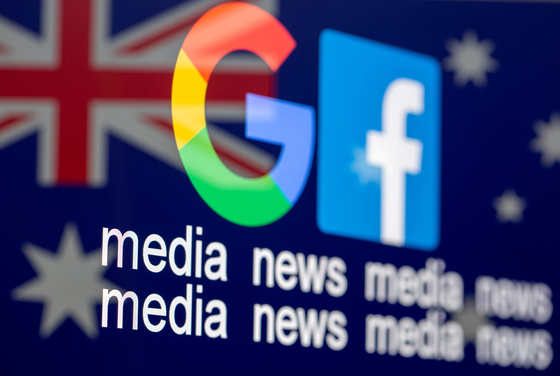![The Australian flag is visible in the background of the Google and Facebook logos. [로이터=연합뉴스]](https://i0.wp.com/pds.joins.com/news/component/htmlphoto_mmdata/202102/25/3f2436f3-1c07-4c9e-aee4-462e857c7de2.jpg?w=560&ssl=1)
The Australian flag is visible in the background of the Google and Facebook logos. [로이터=연합뉴스]
A bill was enacted in Australia that would require companies such as Google and Facebook to pay news usage fees. The first cases of passing came out while the UK and Canada were pushing for similar legislation.
Passed Australia’s’Media and Platform Mandate Negotiation Act’
Mandatory payment of news usage fees to platform companies
The UK and Canada also seem to receive momentum
On the 25th (local time), according to Reuters, the Australian Parliament enacted the’News Media and Digital Platforms Mandatory Bargaining Code’.
The bill mandated that so-called’Big Tech’, which owns a large digital platform, must negotiate and pay a fee for use of news from Australian media. If negotiations are not concluded autonomously, the government will go through a binding mediation process. The government’s intervention clause was put in place to prevent Google and Facebook from taking advantage of their dominant position to lead the negotiations.
Australian Treasury Secretary Josh Friedenberg and Communications Secretary Paul Fletcher made a joint statement today, saying, “This bill ensures that the media will receive fair compensation for their content, which will help maintain the public interest of journalism.” Said. However, the Australian government has decided to consider the first year of the legislation as a review period.
Facebook, which once stopped the local news service in response to the Australian legislation, also changed its position.
On the 24th, the Wall Street Journal (WSJ) reported that Facebook decided to spend more than 1 billion dollars (about 1,107 billion won) for news usage over the next three years. “We have invested $600 million since 2018 to support the news industry and plan to invest at least $1 billion over the next three years,” said Nick Clegg, vice president of global affairs at Facebook. “We know for sure that quality journalism is at the heart of an open society working and we are willing to work with the media.”
Google previously announced that it would spend more than $1 billion over three years on news content. Google recently signed a royalty contract with Seven West Media, an Australian media company, and News Corporation (Newscorp) owned by Australian media conglomerate Rupert Murdoch. Newscorp operates the Wall Street Journal, Barrence, Market Watch, and New York Post in the US, The Sun, The Times, and the Sunday Times in the UK, and News.com and Sky News in Australia.
Reuters predicted that the passage of Australia’s legislation will boost the movement of countries preparing for similar legislation, such as the UK and Canada.
![Google office in New York, USA. [AP통신=연합뉴스]](https://i0.wp.com/pds.joins.com/news/component/htmlphoto_mmdata/202102/25/94d42565-4da7-4628-87a0-3b90da441f30.jpg?w=560&ssl=1)
Google office in New York, USA. [AP통신=연합뉴스]
Initially, Google and Facebook strongly opposed the move to enact Australian media laws, but they compromised with the Australian government ahead of the legislation.
In particular, Facebook confronted the Australian government until the end. Mark Zuckerberg, Facebook CEO, said on the 17th, “The bill came out of misunderstanding the relationship between the platform and the media. The media voluntarily uploaded articles (on Facebook), and through this, 400 million won last year. It has earned 7 million Australian dollars (about 349 billion won).”
Facebook finally stopped the news service in Australia on the 18th, then resumed the service in a compromise with the Australian government on the 22nd. In the process, the Australian government also stepped back and revised some provisions of the bill.
The amendment included “if Google and Facebook proved to have made’significant contributions’ to the Australian news industry, they would give (exempt) discretion in the government’s compulsory arbitration proceedings.”
In response, some lawmakers and media protested, saying that it was “a provision that could be disadvantageous to small media that are behind in bargaining power,” but the bill was passed with revised content.
Reporter Jeong Eun-hye [email protected]
![]()
